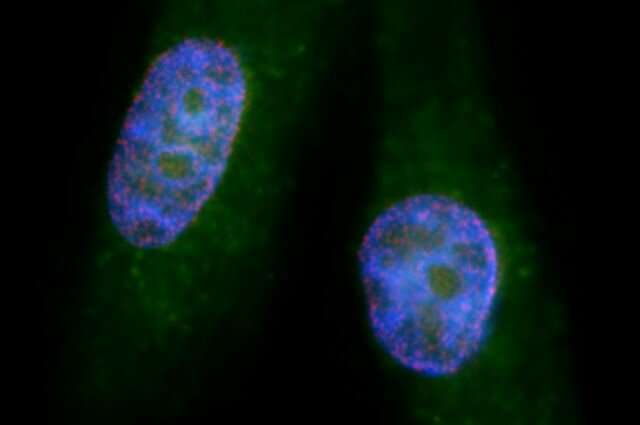Researchers identify potential new combination treatment for pancreatic cancer

Researchers from UCLA's Jonsson Comprehensive Cancer Center have identified a possible new therapeutic strategy using two types of drug inhibitors at once to treat one of the world's deadliest cancers. The combination approach uses one drug that inhibits the process—known as lysosome—that allows cancer cells to recycle essential nutrients to survive, and another drug that blocks the pathway used to repair DNA. Researchers found the approach to be promising after testing it on pancreatic cancer cells and mice in the laboratory.
Pancreatic cancer, which is the third leading cause of cancer-related deaths in the United States, is known to be highly resistant to treatments. The lack of effective treatments also suggests there is an inadequate understanding of the biologic complexity of the disease and the mechanisms to explain why this type of cancer often becomes resistant to therapies that work in treating other types of cancers.
Because of these limitations, researchers have sought to better understand how the cancer cell pathways work to help identify potential new targets for therapies. Pancreatic cancer cells rely on lysosome-dependent pathways, which are an essential component of autophagy, where cancer cells break down and recycle some of their own components for fuel. Understanding the underlying mechanism and impact of inhibiting this pathway can lead to new treatment strategies for the disease.
Researchers studied two sets of data to try to understand the mechanism of lysosome-dependent pathways. The team first took chloroquine, a readily available drug used to treat malaria, and combined it with more than 500 different inhibitors to screen for any unexplored interactions that could yield a "synergistic" effect. This occurs when the effects of two drugs combined together produce a more powerful response than if they were used alone. With this information, the team found a complementary inhibitor called replication stress response inhibitor. In the second set of data, the researchers measured metabolites—small molecules—in pancreatic tumor cells that were treated with chloroquine alone. They found the drug causes a reduction in aspartate, an important amino acid to synthesize nucleotides, the building blocks for DNA replication and repair.
The study provides evidence that using chloroquine in combination with an inhibitor of the replication stress response pathway could be a new treatment to reduce tumor growth in pancreatic cancer patients and help improve the prognosis for people with the disease. The findings also stress the importance of learning how existing drugs work to repurpose them for potential use in treating other diseases.
The research is published in the Proceedings of the National Academy of Sciences.
More information: Lysosome inhibition sensitizes pancreatic cancer to replication stress by aspartate depletion, Proceedings of the National Academy of Sciences (2019). DOI: 10.1073/pnas.1812410116 , www.pnas.org/content/early/2019/03/19/1812410116

















